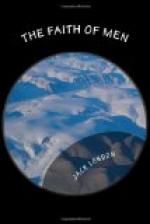For four years Neil Bonner’s mind had lain fallow. Little that was new had been added to it, but it had undergone a process of selection. It had, so to say, been purged of the trivial and superfluous. He had lived quick years, down in the world; and, up in the wilds, time had been given him to organize the confused mass of his experiences. His superficial standards had been flung to the winds and new standards erected on deeper and broader generalizations. Concerning civilization, he had gone away with one set of values, had returned with another set of values. Aided, also, by the earth smells in his nostrils and the earth sights in his eyes, he laid hold of the inner significance of civilization, beholding with clear vision its futilities and powers. It was a simple little philosophy he evolved. Clean living was the way to grace. Duty performed was sanctification. One must live clean and do his duty in order that he might work. Work was salvation. And to work toward life abundant, and more abundant, was to be in line with the scheme of things and the will of God.
Primarily, he was of the city. And his fresh earth grip and virile conception of humanity gave him a finer sense of civilization and endeared civilization to him. Day by day the people of the city clung closer to him and the world loomed more colossal. And, day by day, Alaska grew more remote and less real. And then he met Kitty Sharon—a woman of his own flesh and blood and kind; a woman who put her hand into his hand and drew him to her, till he forgot the day and hour and the time of the year the first snow flies on the Yukon.
Jees Uck moved into her grand log-house and dreamed away three golden summer months. Then came the autumn, post-haste before the down rush of winter. The air grew thin and sharp, the days thin and short. The river ran sluggishly, and skin ice formed in the quiet eddies. All migratory life departed south, and silence fell upon the land. The first snow flurries came, and the last homing steamboat bucked desperately into the running mush ice. Then came the hard ice, solid cakes and sheets, till the Yukon ran level with its banks. And when all this ceased the river stood still and the blinking days lost themselves in the darkness.
John Thompson, the new agent, laughed; but Jees Uck had faith in the mischances of sea and river. Neil Bonner might be frozen in anywhere between Chilkoot Pass and St. Michael’s, for the last travellers of the year are always caught by the ice, when they exchange boat for sled and dash on through the long hours behind the flying dogs.




